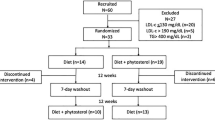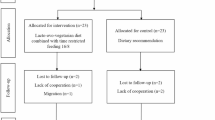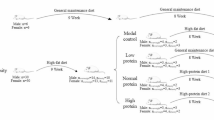Abstract
Objective:
To examine the impact of nonfat and low-fat phytosterol-enriched beverages on low-density lipoprotein (LDL) electrophoretic characteristics.
Design:
Double-blind, randomized, crossover, placebo-controlled dietary trial.
Setting:
Diets were prepared and consumed at the Mary Emily Clinical Nutrition Research Unit of McGill University. Analyses were performed at the Institute on Nutraceuticals and Functional Foods of Laval University.
Subjects and intervention:
In total, 15 moderately hypercholesterolemic persons consumed each of three experimental diets that each comprised a different beverage: nonfat placebo (NF control), nonfat with phytosterols (NFPS) or low-fat with phytosterols (LFPS). Participants consumed three beverages daily at meal time for a total of 1.8 g of phytosterols per day. Nondenaturing 2–16% polyacrylamide gradient gel electrophoreses were used to characterize LDL size characteristics.
Results:
The NFPS and LFPS beverage induced no significant changes in several features of the LDL size phenotype compared to the control diet.
Conclusion:
The consumption of phytosterol-supplemented nonfat and low-fat beverages is not associated with clinically meaningful changes in the LDL particle size phenotype.
Sponsorship:
This study was supported partly by the Canada Research Chair in Nutrition, Functional Foods and Cardiovascular Health (B Lamarche) and by the Dairy Farmers of Canada.
This is a preview of subscription content, access via your institution
Access options
Subscribe to this journal
Receive 12 print issues and online access
$259.00 per year
only $21.58 per issue
Buy this article
- Purchase on SpringerLink
- Instant access to the full article PDF.
USD 39.95
Prices may be subject to local taxes which are calculated during checkout
Similar content being viewed by others
References
Armstrong MJ & Carey MC (1987): Thermodynamic and molecular determinants of sterol solubilities in bile salt micelles. J. Lipid Res. 28, 1144–1155.
Austin MA (2000): Triglyceride, small, dense low-density lipoprotein, and the atherogenic lipoprotein phenotype. Curr. Atheroscler. Rep. 2, 200–207.
Charest A, Desroches S, Vanstone CA, Jones PJH & Lamarche B (2004): Unesterified plant sterols and stanols do not effect LDL electrophoretic characteristics in hypercholesterolemic subjects. J. Nutr. 134, 592–595.
Desroches S, Mauger JF, Ausman LM, Lichtenstein AH & Lamarche B (2004): Soy protein favorably affects LDL size independently of isoflavones in hypercholesterolemic men and women. J. Nutr. 134, 574–579.
Dreon DM, Fernstrom HA, Miller B & Krauss RM (1994): Low-density lipoprotein subclass patterns and lipoprotein response to a reduced-fat diet in men. FASEB J. 8, 121–126.
Hallikainen MA, Sarkkinen ES & Uusitupa MI (2000): Plant stanol esters affect serum cholesterol concentrations of hypercholesterolemic men and women in a dose-dependent manner. J. Nutr. 130, 767–776.
Jones PJ, Ntanios FY, Raeini-Sarjaz M & Vanstone CA (1999): Cholesterol-lowering efficacy of a sitostanol-containing phytosterol mixture with a prudent diet in hyperlipidemic men. Am. J. Clin. Nutr. 69, 1144–1150.
Jones PJ, Raeini-Sarjaz M, Ntanios FY, Vanstone CA, Feng JY & Parsons WE (2000): Modulation of plasma lipid levels and cholesterol kinetics by phytosterol versus phytostanol esters. J. Lipid Res. 41, 697–705.
Jones PJ, Vanstone CA, Raieni-Sarjaz M & St Onge MP (2003): Phytosterols in low-and non-fat beverages as part of a controlled diet fail to lower plasma lipid levels. J. Lipid Res. 44, 1713–1719.
Krauss RM & Dreon DM (1995): Low-density-lipoprotein subclasses and response to a low-fat diet in healthy men. Am. J. Clin. Nutr. 62, 478S–487S.
Lamarche B, Lemieux I & Despres JP (1999): The small, dense LDL phenotype and the risk of coronary heart disease: epidemiology, patho-physiology and therapeutic aspects. Diabetes Metab. 25, 199–211.
Matvienko OA, Lewis DS, Swanson M, Arndt B, Rainwater DL, Stewart J & Alekel DL (2002): A single daily dose of soybean phytosterols in ground beef decreases serum total cholesterol and LDL cholesterol in young, mildly hypercholesterolemic men. Am. J. Clin. Nutr. 76, 57–64.
Mensink RP, Ebbing S, Lindhout M, Plat J & van Heugten MM (2002): Effects of plant stanol esters supplied in low-fat yoghurt on serum lipids and lipoproteins, non-cholesterol sterols and fat soluble antioxidant concentrations. Atherosclerosis 160, 205–213.
Mifflin MD, St Jeor ST, Hill LA, Scott BJ, Daugherty SA & Koh YO (1990): A new predictive equation for resting energy expenditure in healthy individuals. Am. J. Clin. Nutr. 51, 241–247.
Nestel P, Cehum M, Pomeroy S, Abbey M & Weldon G (2001): Cholesterol-lowering effects of plant sterol esters and non-esterified stanols in margarine, butter and low-fat foods. Eur. J. Clin. Nutr. 55, 1084–1090.
Pedersen A, Baumstark MW, Marckmann P, Gylling H & Sandstrom B (2000): An olive oil-rich diet results in higher concentrations of LDL cholesterol and a higher number of LDL subfraction particles than rapeseed oil and sunflower oil diets. J. Lipid Res. 41, 1901–1911.
St-Pierre AC, Ruel IL, Cantin B, Dagenais GR, Bernard PM, Despres JP & Lamarche B (2001): Comparison of various electrophoretic characteristics of LDL particles and their relationship to the risk of ischemic heart disease. Circulation 104, 2295–2299.
Tikkanen MJ, Hogstrom P, Tuomilehto J, Keinanen-Kiukaanniemi S, Sundvall J & Karppanen H (2001): Effect of a diet based on low-fat foods enriched with nonesterified plant sterols and mineral nutrients on serum cholesterol. Am. J. Cardiol. 88, 1157–1162.
Vanstone CA, Raeini-Sarjaz M, Parsons WE & Jones PJ (2002): Unesterified plant sterols and stanols lower LDL-cholesterol concentrations equivalently in hypercholesterolemic persons. Am. J. Clin. Nutr. 76, 1272–1278.
Volpe R, Niittynen L, Korpela R, Sirtori C, Bucci A, Fraone N & Pazzucconi F (2001): Effects of yoghurt enriched with plant sterols on serum lipids in patients with moderate hypercholesterolaemia. Br. J. Nutr. 86, 233–239.
Acknowledgements
We thank Jean-François Mauger for his help in the determination of LDL-particle size analyses and Mahmoud Raeini-Sarjaz for the statistical analyses of the lipid data. We also greatly appreciated the assistance of the staff of the Mary Emily Clinical Nutrition Research Unit.
Author information
Authors and Affiliations
Corresponding author
Additional information
Guarantor: B Lamarche.
Contributors: AC was responsible for characterization of the LDL by PAGE, for data analysis and redaction of the article under the supervision and in the laboratory of BL. PJH designed and conducted the intervention study at McGill University. CAV and MPSO contributed to the study design and managed the dietary intervention. WP monitored the participants during the study. All contributors approved the manuscript.
Rights and permissions
About this article
Cite this article
Charest, A., Vanstone, C., St-Onge, M. et al. Phytosterols in nonfat and low-fat beverages have no impact on the LDL size phenotype. Eur J Clin Nutr 59, 801–804 (2005). https://doi.org/10.1038/sj.ejcn.1602142
Received:
Revised:
Accepted:
Published:
Issue date:
DOI: https://doi.org/10.1038/sj.ejcn.1602142



